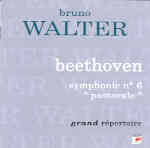Bruno Walter always did a fine Pastorale, and if you find the prospect of his teaming up with the Fabulous Philadelphians in 1946 tempting, you’re inclinations will be amply rewarded. Adopting speeds for each movement a bit on the swifter side of average, this performance flows with effortless ease and grace. What makes it so remarkable is the fact that Walter does practically nothing obvious at all–a slight ritard here, a tiny push there, and the result is a sort of primal “happening”. The music simply springs to fully-fledged life just as Athena emerged in all her glory from the head of Zeus.
Of course, there’s nothing especially mysterious about how Walter does it, and in fact this performance offers a textbook case of how great conductors go beyond matters of obvious tempo variation and still present a memorable, personal vision. Walter makes his points through ensemble balance, phrasing, rhythm, and with the help of some terrific first-desk wind players (listen to the oboe solo in the trio of the scherzo). Despite the dynamic limitations of the recording, Walter obtains textures of amazing transparency, particularly in the first two movements, with superbly solid bass lines that never get submerged or blur into a meaningless blob of sound somewhere in the depths. One example: those two wonderfully sustained crescendos in the first-movement development section, where you also will note the careful attention to correct rhythm and proper note values in the strings’ repeated figurations.
The scherzo displays Walter’s subtle treatment of tempo, the entire thing up to the repeat being a series of accelerations applied so cleverly that by the time you come to the whirling country dance you’ll be amazed at how fast the music is actually moving. The storm blows by quickly, with excellent rhythmic precision (despite inevitably recessed timpani) and after a perfectly smooth transition the finale floats in with unaffected dignity. They really don’t come better than this, and the dynamically charged reading of the rarely heard Leonore No. 2 Overture (from 1959 with the Columbia Symphony) sets the seal on a Beethoven experience of genuine greatness. The remastering has removed almost all tape hiss without significant loss in the high frequencies, and the only problem with this (as with so many of these Sony France productions) is the terrible typesetting on the tray cards. This one also gives the dates for a Coriolan overture that isn’t on the disc! A wonderful release, all the same.
































